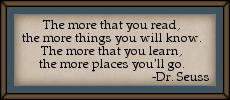|
So you've decided you want to home school. Now what do you do?
Well, first, relax! Home school is NOT public school at home. And depending on what state you live in, the
laws for home schooling will vary. But, basically, the idea of home schooling is the same.
First, write a letter of intent to your local school board. This is just what it says, a letter in writing.
What it must contain is: that you desire to begin a home school program, your child's full name and date of birth. The
address for the child, and parents names. And then sign it. If you are enrolling more than one child into home
school you still only need to send one letter, simply put the names and birth dates of each child in the letter.
Second, make a portfolio. Now what on earth is a "portfolio"? It's really quite simple. It's a 3 ring
binder, about 1 to 1 1/2 inches. In this binder you put: A list of all resources used for the year, divided by subject.
A list of all field trips taken. A list of all books read by the student complete with author and date read. A
list of all films viewed, complete with title and date. Samples of the student's work, and that is just that, samples...not
everything they did for the whole year. Just some things from the beginning, middle and end of the school year.
And your journal. Now, the journal isn't really a lengthy and detailed journal. Think of it more as a planner.
Write down what the child did each day educationally. Something like: Bible: Read Genesis Chapter one and discussed
it. Math: cover addition and subtraction. History: Learn about Christopher Columbus. You get the idea.
And, then, figure out what you want to teach. Do you want to build your own curriculum? Buy curriculum from
a reputible source? Or enroll your child in a "school" where the work is done at home? Do you desire more online or
hands on activities and lessons? Do you want to unschool? Is the Classical or Ecclectic approach to home schooling better
for you? All of these are decisions you should make, you know your child better than anyone else. And do understand,
that over the course of home schooling, you might find that your approach to teaching will vary. I consider myself and
ecclectic home schooler. Why? Because we have tid bits from various teaching and learning styles in our home school.
But, it is what works for us.
Now, what else is there to tell you about home schooling? Well, it's not at all as difficult as most people make
it out to be. Simply figure out what your child knows and go from there. If you find something that excites your
child and makes them desire to learn more, then either incorporate that into your "formal teaching" or allow the child the
freedom to study that on their own. For my son, that "thing" is weather. I've watched and discussed more issues
on the Weather Channel and Storm Stories than I care to think about. At times, it can get irritating, but I have to
remind myself that where it comes to weather, he's a little sponge. The same goes for Math. Last year, we covered
two HUGE math books. And he would get upset if I went a day without giving him a math worksheet to do, or in some other
way incorporating math into our day. You will also find areas that your child down right despises. For me, that
is coloring. My 6 yr. old HATES to color. And we fought often about it because I thought "but kids color in school,
he has to color". Then one day I took a step back and asked myself "how important is coloring? How will it help
him?" Hmm. Coloring builds fine motor skills and is a way of "following directions". But, it isn't the most
important thing in learning. Would I rather fight about coloring or have a child who wanted to learn? When we
fought he didn't want to learn. My fighting about coloring was defeating my purpose. I stopped fighting.
There were other ways to get him to follow instructions. And I found that he would color math sheets (the ones that
you have to color the answer to a problem a certain color to form a big picture) at will, and do them neatly.

Now, to Explore the Various Methods for Homeschool
**Notice: I do NOT endorse all of these forms of education, but they are approved homeschooling methods, so I listed
them.**
Then there is Distance Learning, which is homeschooling through an accredited school. It is usually done
via mail or internet, sometimes both. And last, but not least, is....Traditional Education.....aka...public school
at home. It's public school and everything that is taught in the public schools, but outside of the classroom.

|

